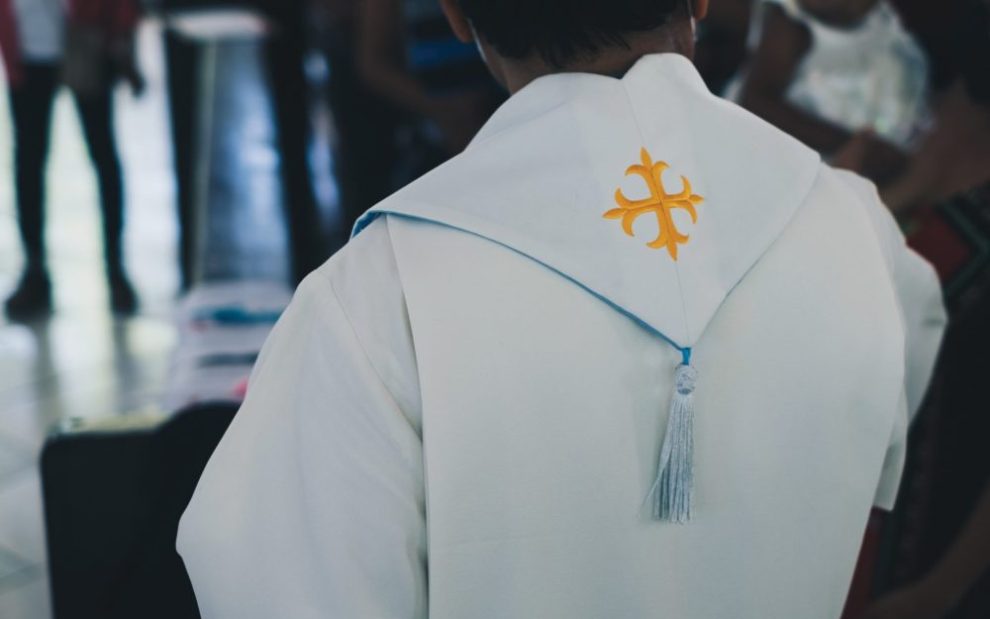Pope Francis’ recent declaration, Fiducia Supplicans (On the Pastoral Meaning of Blessings), has garnered much attention around the globe, including everything from enthusiastic endorsements to cries of heresy and schism. These responses were so dramatic and varied, in fact, that the Dicastery for the Doctrine of the Faith followed up with a press release “concerning the reception of Fiducia Supplicans.”
Fiducia Supplicans, however, cannot be reduced to random sound bites or indiscriminately chopped up for meaty quotes. To truly understand the significance of this document, one must examine the declaration for what it is: a discourse on the pastoral meaning of blessings. Part of this discourse includes consideration of couples in irregular situations and couples of the same sex.
Fiducia Supplicans begins by taking a firm stance on the traditional church doctrine about marriage. In fact, this is explicitly stated within the document, noting that the church does not have the power to confer blessings to unions that “presume to be marriage” or those that involve “extra-marital sexual practice.” Similarly, the declaration clearly states that blessings should never be performed with ceremonies of a civil union or “with any clothing, gestures, or words that are proper to a wedding.”
The novelty of the declaration, however, is a “broadening and enrichment of the classical understanding of blessings” that is grounded in pastoral charity and an adamant reminder that it is indeed God who blesses. The grace of God “works in the lives of those who do not claim to be righteous but who acknowledge themselves humbly, as sinners, like everyone else. This grace can orient everything according to the mysterious and unpredictable designs of God.” Thus, couples in irregular situations and same sex couples may receive blessings. The caveat here is that these blessings are spontaneous and not to be confused with liturgical or sacramental rites. With this, the ordained minister “could ask that the individuals have peace, health, a spirit of patience, dialogue, and mutual assistance—but also God’s light and strength to be able to fulfill his will completely.”
To say that Fiducia Supplicans somehow undermines the traditional understanding of marriage is a dangerous misreading of the declaration. But so too is the claim that Fiducia Supplicans endorses a sacramental or liturgical rite for blessings of couples in irregular situations, including couples of the same sex. Rather, Fiducia Supplicans is a sincere and pastorally grounded attempt to make known the love of God to all people, for the church is the “sacrament of God’s infinite love,” and a blessing is an “invitation to draw even closer to the love of Christ.”
The press release concerning the reception of Fiducia Supplicans, issued just a few weeks after the initial proclamation, responds to the critiques from all sides. It begins: “We are writing this press release to help clarify the reception of Fiducia Supplicans, while recommending at the same time a full and calm reading of the declaration so as to better understand its meaning and purpose.” Without backtracking on the original statement, the press release reiterates the contents of the original proclamation and notes—in response to some bishops—that the declaration is not heretical, contrary to the tradition of the church, or blasphemous.
The press release does, however, note that for practical reasons the application of the declaration may take time in some locations and contexts. Additionally, the potential need for catechesis is also noted. Even so, these “different methods of application” cannot be a “total or definitive denial” of the expectations of Fiducia Supplicans.
How can I receive a blessing?
Based on Fiducia Supplicans, LGBTQ couples should feel supported by the church (and her ministers) when they seek a blessing. It is important, however for “couples in irregular situations and couples of the same sex” to know what they can (and cannot) expect from this blessing.
First, the declaration makes it clear that the blessing cannot be part of a liturgical rite, nor can it be associated with a sacramental celebration of matrimony or a civil celebration of marriage. Second, the press release notes that these blessings do not “intend to justify anything that is not morally acceptable.” Rather, the document states that the couple should come forward as “two persons who ask for God’s help.” In these cases, the pastor or priest “does not impose conditions and does not enquire about the intimate lives of these people.”
These “pastoral blessings” must be very short, “lasting a few seconds, without an approved ritual or without a book of blessings.” The word “spontaneous” is used multiple times, suggesting that the request for the blessing should not be prearranged and “must not take place in a prominent place within a sacred building, or in front of an altar.”
The press release offers an example of what this blessing may look like, followed by a sign of the cross on each of the two persons: “Lord, look at these children of yours, grant them health, work, peace, and mutual help. Free them from everything that contradicts your gospel and allow them to live according to your will. Amen.”
For this survey, we asked more than 200 writers who have contributed to the magazine for their reactions to Fiducia Supplicans. Below is a selection of their responses.
What are your thoughts on Fiducia Supplicans?
I am Jewish and married a Catholic woman. We raise our children as Catholics, and I am interested and at many times moved by observing their journeys of faith. I welcome a more inclusive church, and it saddens me to think there are those who would oppose such a basic dignifying gesture.
—Max Ekstrom
I think it is reflective of just how virulent the homophobia is in the church that previously priests didn’t even know if they could bless a gay or queer couple. Priests will bless your dog, your car, or even your AR-15. But previously they thought they could refuse a request for a blessing just because the parishioners were gay? Atrocious! And this is not what LGBTQ Catholics asked for. They asked to have their marriages acknowledged. This was the church handing their children a stone when they asked for bread and saying, “Be grateful you got anything from us. Just pretend it’s bread and be less hungry.”
It’s an indication that the church under Pope Francis’ leadership is learning how to respect the lived experience of believers. The pope is challenging us to reconsider our understanding of sexuality; in effect, Pope Francis’ actions say that just repeating the past might not be accurate, respectful, or founded on the gospel.
While I am grateful for an acknowldgment that LGBTQ couples have a relationship worthy of blessing and deserving of the grace of God a blessing contains, I am disappointed at the explicitness with which this declaration reifies the definition of sacramental marriage as between one man and one woman. To me, this declaration is one step forward and two steps back in the journey toward a safe and affirming home for LGBTQ people in the Catholic Church.
Our parish has always welcomed and celebrated LGBTQ people, but we are not the norm in our archdiocese. I am so grateful that Pope Francis continues to live the gospel by accepting and welcoming those who have previously been ostracized by the church. Bit by bit, he is making a way out of no way for all faithful Catholics to fully experience the love of God in the Catholic Church.
I know for non-Catholics in the United States the change seems minor and not enough. And there are plenty of Catholics who also want and deserve more. It comes as no surprise that something so historic would happen under Pope Francis. He makes me proud to be Catholic. I had multiple friends text me that they were moved they could one day receive a blessing.
What would a good blessing for LGBTQ couples say?
May God bless you and be gracious to you. May you always bear witness to the overabundance of divine love in your lives and reflect that love to all in your lives.
May the delight and presence of God your Maker, Redeemer, and Guide be upon each moment and each element of your life together. May you love one another as Christ has loved you. May you forgive one another as needed, uphold one another in hardship, and may you bless together any children you may have, and all within your circle of influence. Your love for one another is holy, and pleasing to God, and honorable for all. May the Living One smile upon you both and grant you peace.
May your love grow deep roots even as it reaches toward the Light of God, blossoming into breathtaking beauty that will inspire all who witness it.
We are humbly thankful that [name] and [name] have trusted us to witness their commitment to each other and to you. We ask forgiveness for the times our church and our world have forgotten that where love exists, there you are. May we look to [name] and [name] as examples of devotion, fidelity, and faith that build the kingdom of God on Earth. And when [name] and [name] look to you for strength, belonging, and support, may they always, always find it here, among your people. Amen.
God, Loving Creator, who willed to take on humanity and live as one among us in the joys and sorrows of human life, send your blessing upon [name] and [name] that they may serve you, each other, and all your people, faithfully, through the gifts and commitments you bestow upon them. Amen.
Beloveds, may God bless the life-giving love that you share so that—pressed down, shaken together, and running over—it may bless the lives of others and serve as a witness to the joy of Jesus Christ. And may God keep you in the harbor of this holy love, that you might always know your sacred worth as a beloved child of God. Amen.
What does receiving a blessing mean for you?
For me, it would mean being part of my family again. Coming from a Catholic family, sacraments are key moments when people come together to celebrate, and for me, I could not celebrate my marriage, my partnership, in the same way as my loved ones could celebrate their own relationships. It also means, as the niece of a priest, that he could not celebrate my marriage—continuing his promise to celebrate all of the sacraments for his nieces and nephews.
A blessing is a gentle reminder of the faith that inhabits my heart, a tender moment of tradition that enfolds me in the presence of God.
Attending with gratitude and love to the presence of the divine as it manifests in embodied experience.
The late Father Michael J. Himes wrote once “What makes Catholicism Catholic . . . is the sacramental principle. The sacramental principle means that what is always and everywhere the case, must be noticed, accepted, and celebrated somewhere sometime.” This, he would go on to write, is the underpinning of creation which we call grace. Grace is another word for God’s love available to creation, to all of us, always and in all ways. God’s grace is manifested in every interaction. Grace is also fundamental to understanding both the institutional seven Sacraments and the sacramental experiences of everyday life.
Therefore, anytime my abuela, my dad, my wife, or my 2-year-old son blesses me or I bless them, it is a reminder that we are always in the loving presence of our creator, in the loving presence of one another, and in the loving presence of our common home.
During the nearly three years it took for my annulment to be granted, I attended Mass nearly every day—frustrated that I could not yet partake [in the Eucharist], hungry to be included, and secretly afraid it might never happen. But each time I went forward with arms crossed during communion, I received a loving blessing. That blessing, which was never perfunctory, always warm, compassionate, and focused entirely on me in my half-in, half-out situation, made all the difference. It gave me the courage to continue waiting in hope. I have now been a Catholic for over 30 years, but I still remember how strengthening and healing it was to receive that simple blessing. What it conveyed to me was that, whether or not I was officially inside or outside the church, still and all I was not only loved by God but also by the body of Christ.
General comments:
One small step for the church, one giant step for those whose love has been in the shadows.
My hot take as a Catholic scholar of Catholics: It is, at once, a really big deal and too little too late. It is both a powerful sign of how Pope Francis and others have worked hard to shift the (official) church away from its oppressive and regressive sexual politics, and a largely symbolic act that does not fundamentally change theology or sacramental life. That said, as we know, for Catholics, symbols are never simply “symbolic” in the ways secular Americans tend to think of that term. Which is why I do think it is deeply meaningful, even if it does not go as far as I would like to welcome our LGBTQ siblings into the full life of our spiritual community.
As a college professor, I often meet students who feel alienated from the church because of how the church’s teachings on LGBTQ ethics have been presented to them. I can think of many who have told me, sometimes with tears, that this is why they stop attending church. This is an enormous loss for all of us, including those of us who identify as straight. And I pray that Fiducia Supplicans may help LGBTQ young adults and their friends and families see their dignity and keep them from leaving.
Blessing is a prayer for growth in goodness. Everyone needs that. Judging people because of mere externals is more of a problem than a blessing.
A theology of love that stops short of an anthropology of love is not only incoherent for religious life, it is also intellectually dishonest. I think Pope Francis and his advisors see this and are trying to truly build a civilization of love, despite all their own limitations.
This article also appears in the April 2024 issue of U.S. Catholic (Vol. 89, No. 4, pages 15-19). Click here to subscribe to the magazine.
Image: iStock/Lisyl Songco














Add comment